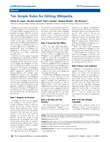Expert outreach
We are working with scientists, scholars, learned societies and funders to help experts improve Wikipedia and its sister projects, bringing that expertise to the widest possible public. This work complements WMUK's partnerships with galleries, libraries, archives and museums as well as its support for higher education.
Guidance
We are developing guidance for researchers and public engagement professionals on how Wikimedia can magnify the impact of their work.
- Wikimedia as a public engagement tool for scientists
- Wikimedia as a public engagement tool for the arts and humanities
A separate page answers questions we have been asked by potential expert contributors.
- A guide for expert contributors to Wikipedia published in PLoS Computational Biology by a group of Wellcome Trust Sanger Institute scientists (and Wikimedia UK volunteers)
- Feature article for the Physics World magazine and site (free registration required) by Martin Poulter and Mike Peel
Wikipedians in Residence
The Royal Society, the Wellcome Trust, and the Arts & Humanities Research Council are among the bodies that have employed Wikipedians in the UK. Proposals are welcomed from scholarly and cultural institutions.
From July 2013 to April 2014, Jisc and Wikimedia UK are jointly supporting a project to encourage a range of audiences (librarians, teachers, researchers and students) within learning and research to engage with Wikimedia UK and Wikimedia projects. This includes a programme of workshops in institutions on "Wikimedia: linking research impact and open education". Follow the links for more details.
Events and training
Our Expert outreach events cover a wide range of academic subjects and partner organisations, including universities, scholarly societies and charities.
Please contact Wikimedia UK if you would like to run a joint event or if you want a speaker or a guest article.
Call for volunteers
Wikimedia UK is seeking volunteers to give introductory talks, promote Wikimedia at conferences or deliver training. We can support travel and subsistence, and we can provide handouts and freebies to distribute. Drop a message to daria.cybulska![]() wikimedia.org.uk stating your username on Wikimedia projects, where you can travel to and any relevant background.
wikimedia.org.uk stating your username on Wikimedia projects, where you can travel to and any relevant background.
Expert views
"If you're serious about ensuring public engagement in your research then you need to make damn sure your work can be incorporated into Wikipedia. Wikipedia is the most important engagement channel for your research."

|

|

|
"It is our hope [to] encourage other scholars to refine and improve Wikipedia articles so they might become the world’s most accurate and trusted reference, in addition to the most well read. Freely open and accessible, Wikipedia can improve clinical care at the bedside for physicians around the world by allowing them access to the latest information, regardless of their ability to pay high fees."
"Wikipedia's user-friendly global reach offers an unprecedented opportunity for public engagement with science. Scientists who receive public or charitable funding should therefore seize the opportunity to make sure that Wikipedia articles are understandable, scientifically accurate, well sourced and up-to-date."
"The key challenge for the scholarly community [...] is to work actively with Wikipedia to strengthen its role in 'pre-research.' We need to build stronger links from its entries to more advanced resources that have been created and maintained by the academy."

|

|

|
"I think everyone in principle would like to see more integration of Wikipedia and university History, as a way of bringing academic research out of the ivory tower and into public attention, and equipping our students for the digital world."
"Perhaps other academic societies and professional bodies can contribute to upgrading and extending Wikipedia entries. [...] [T]he advent of several geoscientific Wikipedians would greatly enhance Wikipedia's geological coverage, to the benefit of all."
"Wikipedia is one of the great and lasting achievements of this century and typifies the Digital Enlightenment. It epitomises so much – cooperation, democracy, meritocracy, innovation, challenge to authority. It represents the dream of the Encyclopédie of Denis Diderot and Jean le Rond d’Alembert. [...] When the cultural history of this century is written, Wikipedia will have the same place as the Encyclopédie."

|

|

|
"Dear Wikipedia, I want to thank you and to compliment you on your service. I often use it, especially also for technical information in physics and astronomy. Just now I was impressed by the density of information in your article on QCD, the theory of the strong interaction, in particular, its history."
The images on this page have been shared on Wikimedia Commons by academics, libraries and journals. Click on an image to see the source and copyright information.





